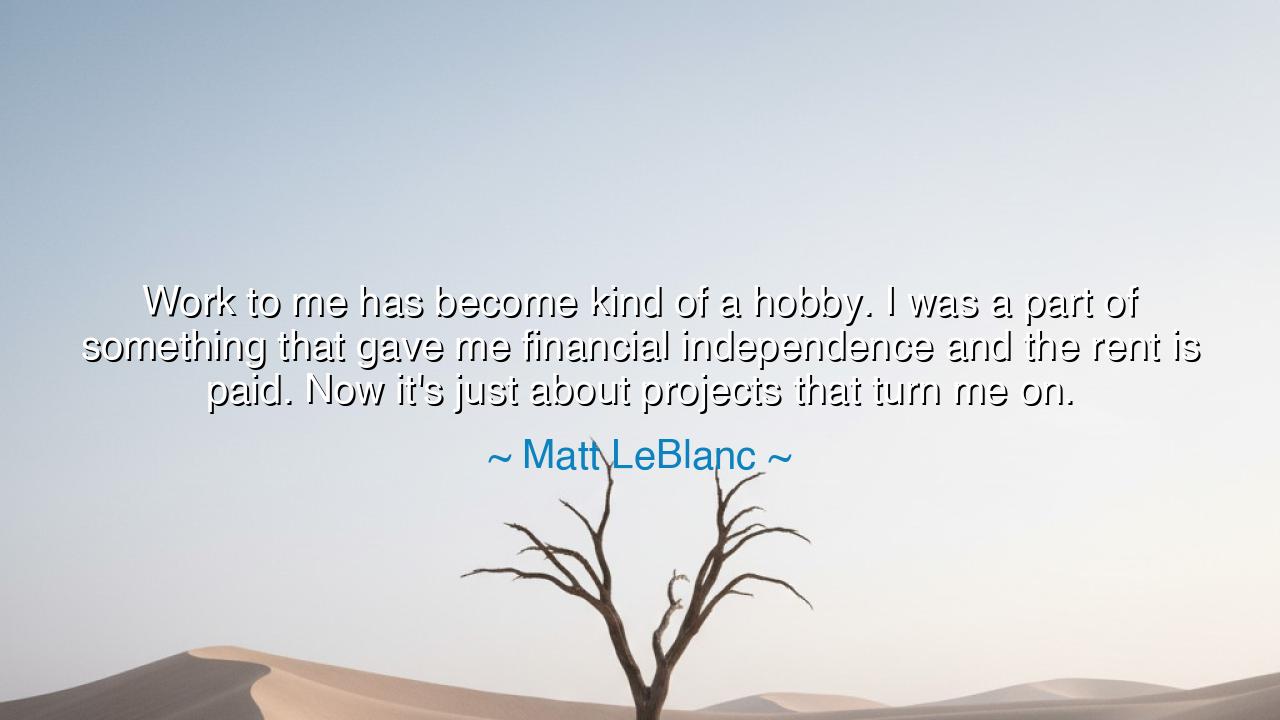
Work to me has become kind of a hobby. I was a part of something
Work to me has become kind of a hobby. I was a part of something that gave me financial independence and the rent is paid. Now it's just about projects that turn me on.






The words of Matt LeBlanc carry the quiet wisdom of a man who has walked through the storm of ambition and emerged into the sunlight of contentment. When he said, “Work to me has become kind of a hobby. I was a part of something that gave me financial independence and the rent is paid. Now it's just about projects that turn me on,” he was not boasting of fortune, but reflecting on freedom—the rare freedom that comes when one’s labor no longer binds the soul, but serves it. His words speak to the journey of every person who has toiled for survival, and then, through perseverance, reached a place where work is not a cage, but a canvas.
To understand the origin of this quote, one must look at the life of Matt LeBlanc, who rose from humble beginnings to worldwide fame through his role as Joey Tribbiani in the beloved television series Friends. For years, he lived the story of many artists—working odd jobs, struggling through rejection, chasing the uncertain flame of success. When Friends became a global phenomenon, it did more than make him famous—it gave him security, the kind that few in his profession ever taste. And so, when he speaks of work becoming a hobby, it is the voice of a man who has learned the difference between working to live and living to create. His words are a reflection not of wealth, but of release—from anxiety, from dependence, from the endless hunger that consumes so many.
There is an ancient rhythm to his insight, for it echoes the wisdom of those who understood that labor, though noble, must not enslave the spirit. In every age, the greatest joy is found not in toil for necessity, but in work born of passion. Consider the philosopher Epicurus, who taught that true happiness lies not in endless striving, but in freedom from want—the point at which one’s needs are met and one’s soul may turn to pleasure, creation, and contemplation. LeBlanc’s realization follows that same current: that once the essentials of life are secured, one may turn from the question of “What must I do?” to “What do I love to do?” It is a transformation from survival to self-expression.
But this state is not easily won. For most of history, work has been the chain that binds man to necessity. From the peasant who labored beneath the sun to the craftsman who bent over his tools by candlelight, independence was a distant dream. Yet those who achieved it—through skill, wisdom, or fortune—became free to use their time not for survival, but for meaning. Think of Leonardo da Vinci, who, having secured the patronage of the Medici, was able to pursue his art, his inventions, and his endless curiosity not as duty, but as joy. His work became his play, his play became his purpose, and in that fusion, he reached the divine harmony that every soul secretly seeks.
In the same way, LeBlanc’s words reveal that the highest form of work is not measured in wealth, but in freedom. When one’s labor no longer serves fear, it can serve inspiration. To work for necessity is human; to work for pleasure is transcendent. This does not mean that comfort should lead to idleness—rather, it invites a new form of diligence, one born of desire instead of demand. The artist paints not for bread, but for beauty; the craftsman builds not for pay, but for pride; the thinker writes not for fame, but for the joy of truth. This is the sacred transformation of labor into love.
Yet, in this truth lies a challenge for every listener. For not all will have the fortune of Matt LeBlanc, whose success bought him time. But every person, in some measure, can learn to reclaim a part of their work as hobby, to find joy even in the midst of duty. When we approach our labor not merely as burden but as craft—when we bring curiosity, purpose, or creativity to what we do—we begin to taste a fragment of that same freedom. Even the smallest spark of joy in one’s work can transform monotony into meaning.
So, let the lesson of this saying be passed down: strive first for independence, then for fulfillment. Let your labor be the ladder, not the prison. Work with devotion while the rent is due, but when your needs are met, work for the fire within you. Passion, not pressure, is the truest form of wealth. The practical path is this—honor your work while you must, but never forget to seek the kind of labor that lifts your spirit. For as LeBlanc reminds us, the highest goal is not to escape work, but to transform it—until your hands create not from obligation, but from delight, and your days are no longer counted by effort, but by inspiration.






AAdministratorAdministrator
Welcome, honored guests. Please leave a comment, we will respond soon